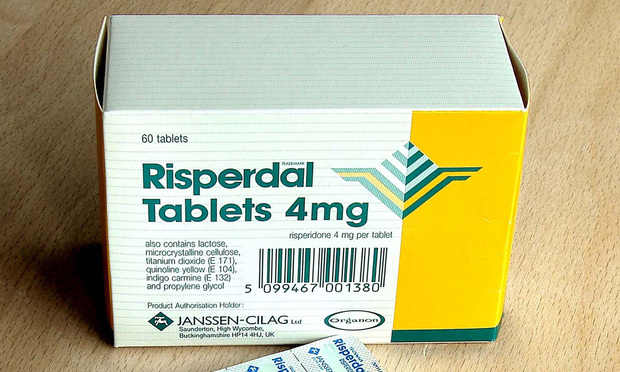Federal Preemption Holding Partially Reversed in Ca. Risperdal Litigation
Addressing one of the first substantive decisions in the Risperdal litigation in California, the Second District Court of Appeal reversed summary judgment as to one of the federal preemption arguments raised by the plaintiffs, reinstating potentially hundreds of lawsuits. The court upheld the ruling as to two separate federal preemption arguments.
May 11, 2020 at 06:14 PM
4 minute read
The original version of this story was published on The Recorder
 Risperdal.
Risperdal.
Addressing one of the first substantive rulings in the Risperdal litigation in California, an appeals court has potentially reinstated hundreds of lawsuits after partially reversing a key decision on federal preemption.
The lawsuits allege that anti-psychotic drug Risperdal, made by Johnson & Johnson's Janssen Pharmaceuticals, causes boys to develop breasts—a condition called gynecomastia. In 2017, Los Angeles Superior Court Judge William Highberger granted summary judgment in lawsuits coordinated in California state courts based on federal preemption.
On May 8, the Second District Court of Appeal reversed the summary judgment decision as to two plaintiffs. The appeals court concluded that, as to one of the arguments raised by the plaintiffs, there was no "clear evidence" under the U.S. Supreme Court's Wyeth v. Levine decision that the U.S. Food and Drug Administration would have rejected a revised warning label on the prescription drug. The court upheld as to two separate federal preemption arguments.
"Impossibility preemption requires the drug manufacturer to show that it fully informed the FDA," Justice Halim Dhanidina wrote. "Janssen did not."
Timothy Clark, of Sanders Phillips Grossman in Irvine, California, who is co-lead plaintiffs counsel in the litigation, said the ruling could reinvigorate thousands of Risperdal lawsuits, and sets the stage for trials.
"This is absolutely a win, across the board," he said. "Every single iteration of the Risperdal label is inaccurate. There is no major obstacle to any of the users of Risperdal to proceed forward with pursuing their claim of failing to warn of gynecomastia."
The Law Office of Martin N. Buchanan, in San Diego, argued the case for the plaintiffs on appeal.
Johnson & Johnson, represented by Faegre Drinker Biddle & Reath in the appeal, downplayed the ruling's significance in a statement: "The court of appeals largely affirmed the dismissal of the plaintiffs' case except for a very narrow theory that the company has not seen factually supported in any of the 320 cases that have been stayed pending this ruling. The company is considering whether to seek further review of the court's limited reversal ruling."
Johnson & Johnson faces 13,000 lawsuits across the country over Risperdal, about 7,000 of which are in Philadelphia Court of Common Pleas, where a jury last year awarded a record $8 billion verdict. A judge later reduced the punitive damages award to $6.8 million. Other verdicts in Philadelphia have been for $2.5 million and $70 million.
In California, where many of the lawsuits named dozens of plaintiffs, no cases have reached trials.
The decision potentially impacts 320 lawsuits filed by individuals who took Risperdal as children after Johnson & Johnson made a label change in 2006 that warned of a gynecomastia risk. The ruling first concluded that the judge, not a jury, had the authority to decide federal preemption under Merck Sharp & Dohme v. Albrecht, a U.S. Supreme Court decision in 2019. That ruling had prompted supplemental briefs in the Risperdal appeal.
As to the merits, the California appeals court rejected federal preemption on other grounds, such as other studies showing the rate of gynecomastia risk or references to the rarity of getting the condition. "Plaintiffs have cherry-picked this language as well as the pediatric studies to create a purported discrepancy in the reported rate of gynecomastia on the risperidone label," the opinion says.
But the appeals court granted summary judgment as to a set of data, known as "table 21," that Johnson & Johnson did not disclose to the FDA. That data showed a "statistically significant association" between Risperdal and elevated blood prolactin levels during various time periods.
"Specifically, table 21 tended to show that children who had elevated prolactin after taking risperidone for eight to 12 weeks were 2.8 times more likely to develop prolactin-related side effects, including gynecomastia," the opinion says, referring to the generic form of Risperdal. "As the risperidone label made no mention of the likelihood of developing side effects related to elevated prolactin levels for different time periods, this information demonstrated a risk of greater frequency then reported on the label."
The decision upheld summary judgment as to a third case in which the appeals court concluded there was no evidence the physician of a child in New York who took Risperdal from 2009 to 2010 would not have changed the prescription had she received the revised warning.
This content has been archived. It is available through our partners, LexisNexis® and Bloomberg Law.
To view this content, please continue to their sites.
Not a Lexis Subscriber?
Subscribe Now
Not a Bloomberg Law Subscriber?
Subscribe Now
NOT FOR REPRINT
© 2025 ALM Global, LLC, All Rights Reserved. Request academic re-use from www.copyright.com. All other uses, submit a request to [email protected]. For more information visit Asset & Logo Licensing.
You Might Like
View All
NJ Firm Narrowly Avoids Case Dismissal Over Lengthy Complaint Filed in Fed Court
4 minute read
AstraZeneca Files Flurry of Lawsuits to Protect Cancer Treatment Drug
3 minute read

Law Firms Mentioned
Trending Stories
Who Got The Work
J. Brugh Lower of Gibbons has entered an appearance for industrial equipment supplier Devco Corporation in a pending trademark infringement lawsuit. The suit, accusing the defendant of selling knock-off Graco products, was filed Dec. 18 in New Jersey District Court by Rivkin Radler on behalf of Graco Inc. and Graco Minnesota. The case, assigned to U.S. District Judge Zahid N. Quraishi, is 3:24-cv-11294, Graco Inc. et al v. Devco Corporation.
Who Got The Work
Rebecca Maller-Stein and Kent A. Yalowitz of Arnold & Porter Kaye Scholer have entered their appearances for Hanaco Venture Capital and its executives, Lior Prosor and David Frankel, in a pending securities lawsuit. The action, filed on Dec. 24 in New York Southern District Court by Zell, Aron & Co. on behalf of Goldeneye Advisors, accuses the defendants of negligently and fraudulently managing the plaintiff's $1 million investment. The case, assigned to U.S. District Judge Vernon S. Broderick, is 1:24-cv-09918, Goldeneye Advisors, LLC v. Hanaco Venture Capital, Ltd. et al.
Who Got The Work
Attorneys from A&O Shearman has stepped in as defense counsel for Toronto-Dominion Bank and other defendants in a pending securities class action. The suit, filed Dec. 11 in New York Southern District Court by Bleichmar Fonti & Auld, accuses the defendants of concealing the bank's 'pervasive' deficiencies in regards to its compliance with the Bank Secrecy Act and the quality of its anti-money laundering controls. The case, assigned to U.S. District Judge Arun Subramanian, is 1:24-cv-09445, Gonzalez v. The Toronto-Dominion Bank et al.
Who Got The Work
Crown Castle International, a Pennsylvania company providing shared communications infrastructure, has turned to Luke D. Wolf of Gordon Rees Scully Mansukhani to fend off a pending breach-of-contract lawsuit. The court action, filed Nov. 25 in Michigan Eastern District Court by Hooper Hathaway PC on behalf of The Town Residences LLC, accuses Crown Castle of failing to transfer approximately $30,000 in utility payments from T-Mobile in breach of a roof-top lease and assignment agreement. The case, assigned to U.S. District Judge Susan K. Declercq, is 2:24-cv-13131, The Town Residences LLC v. T-Mobile US, Inc. et al.
Who Got The Work
Wilfred P. Coronato and Daniel M. Schwartz of McCarter & English have stepped in as defense counsel to Electrolux Home Products Inc. in a pending product liability lawsuit. The court action, filed Nov. 26 in New York Eastern District Court by Poulos Lopiccolo PC and Nagel Rice LLP on behalf of David Stern, alleges that the defendant's refrigerators’ drawers and shelving repeatedly break and fall apart within months after purchase. The case, assigned to U.S. District Judge Joan M. Azrack, is 2:24-cv-08204, Stern v. Electrolux Home Products, Inc.
Featured Firms
Law Offices of Gary Martin Hays & Associates, P.C.
(470) 294-1674
Law Offices of Mark E. Salomone
(857) 444-6468
Smith & Hassler
(713) 739-1250






